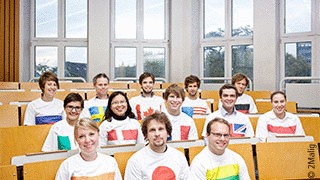
Bachelor Economics
Economic perspectives for societal challenges
Programme Structure and Organisation
The Bachelor's programme in Economics comprises 6 semesters of standard study time. A total of 180 ECTS credits must be completed within the programme. The programme consists of the basic and advanced sections, the specialisation section as well as the Studium Integrale and the Bachelor's thesis:
You can also find this tabular overview in the current Module Catalogue for the B.Sc. Economics.
Course structure
In the basic and advanced sections, the fundamentals of economics and methods are taught and elective options are offered (Behavioural Economics, Ecological Economics, Economic History, International Economics). In the specialisation section, students choose one of three different fields of study:
- Specialisation in Economics ("Economics" with the option of Data Analysis)
- Specialisation in Business Administration ("Economics and Business")
- Specialisation in Social Sciences ("Economics, Politics, and Society")
The Studium Integrale promotes competencies that go beyond the actual subject-related studies. To this end, the various faculties of the University of Cologne offer subject-specific introductory events, competence training (e.g. IT or rhetoric), language courses and lecture series on current topics from which you can choose. As early as in the basic and advanced courses, you will take a seminar in which you will be intensively prepared for scientific work to successfully master the entire degree programme and the Bachelor's thesis at the end.
Optimal combination of teaching formats for the best possible support
Courses are in German or English. Approximately 250 students start the Economics programme in Cologne every year. The programme comprises different teaching formats and is a mixture of large lectures with many participants and exercises or tutorials in small groups. In several compulsory seminar courses and project courses, the group size is limited and allows for intensive interaction and supervision.
Further details on the structure of the degree programme, as well as study progression recommendations and module descriptions, can be found in the module catalogue.
- Information and regulations relevant to the examination can be found in the examination regulations.
If you started your studies before 2021, please select the appropriate documents in the document overview.
Organising your Studies
Studying requires a high degree of self-organisation. Well-prepared and properly informed, you will manage your studies with ease. In the following, we have compiled links to helpful information, relevant tools and counselling centres for you.


KLIPS (General information and course catalogues)

Certificates

Financing

Stays Abroad

FAQ
